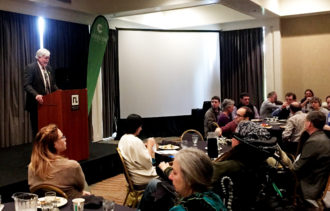WSDOT Secretary Millar: Congestion is a symptom of lacking ‘affordable housing and transportation solutions’

WA Transportation Secretary Roger Millar at the 2017 WA Bike Summit.
WSDOT Secretary Roger Millar delivered a keynote speech to the nation's highway and transportation officials that directly challenged the central focus of transportation investments in nearly every state: Building and expanding freeways.
"We like to talk about traffic congestion as an issue, but it is actually a symptom of a larger problem - and the problem is we don't provide affordable housing and transportation solutions," he told the Joint Policy Committee of the American Association of State Highway and Transportation Officials ("AASHTO") last week, according to the AASHTO Journal. "We have a rich list of transportation options for the rich that can afford to live in our cities - the rest are forced to drive. And they drive vehicles that often can't make the trip."
Millar's take should be a wake-up call not only to state DOTs across the nation, but also to thriving urban centers like Seattle. When Seattle fails to provide affordable housing within areas that are well-served by transit, biking and walking options, the city shares responsibility for forcing people to live in lower-cost, car-dependent areas further from workplaces and other services and destinations. The result is that more people who struggle to afford cars are forced to drive further on a highway system we cannot successfully expand.
"Executive housing and Walmart jobs is not a housing solution - that only puts more people on road," he said.
Millar's solution is to be "stewards of system and not just the builder of projects." That means DOTs must focus their efforts on better managing the existing transportation system and expanding people's travel options, including bike lanes. He also said is it "appalling" that DOT leaders "accept death on the highway as a cost of business."
But the other part of the solution can't come from a DOT. Seattle must dramatically increase its available affordable housing. Seattle's transportation leaders can point fingers at awful car-centric WSDOT projects all day long (I know I sure can!), but if our city doesn't build enough affordable housing then more cars will continue to be the default result.
More from the ASSHTO Journal:
Millar pointed out that managing demand on the system is the key. "Our biggest source of capacity in the system is reducing demand; getting more people to telework, travel at off-peak hours, and by making off-system travel improvements such as adding bike lanes changes demand on system," he explained. "That way we add capacity but only where it makes sense."
Another issue is improving transportation system safety, especially when it comes to roadway fatalities. "We accept death on the highway as a cost of business - that is appalling," Millar noted. "Look at the cost of that. Congestion costs us $2 billion to $ 5 billion, but [roadway] fatalities and accidents have over $8 billion in impact. So safety is a bigger cost issue for us yet is the smallest of our programs."
In the end, he said "being willing and able to take some risks" will be critical for state DOTs to tackle future challenges.
"I've been in this business for 40 years and we need to acknowledge when something is not working and thus be willing to try something different," Millar added. "Simply put, we cannot build our way out of congestion. Together I think we can fix these problems. Together with the state DOT community we can fix the transportation problems facing our country."
Several people have pointed out that Millar's comments come as his department is moving forward with a big freeway project in Spokane that will eliminate 400 homes:
I would have thought demolishing homes to build a massive freeway would be antithetical to @MillarRoger's progressive legacy at WSDOT. Apparently I am wrong. https://t.co/8TstpPNoSQ
- Ryan Packer (@typewriteralley) July 24, 2018
This is perhaps a reminder that the way we fund transportation projects (state lawmakers earmarking projects in funding laws) makes it far more difficult to make bold changes to our transportation philosophy. The 16-year transportation package passed in 2015 includes many billions for specific freeway projects, including that Spokane freeway. It is very hard to stop a major project that has funding, even if we know that it is not a wise investment. If WSDOT is the proverbial big ship that turns slowly, Millar's words here come less as the ship's captain and more as the lookout.